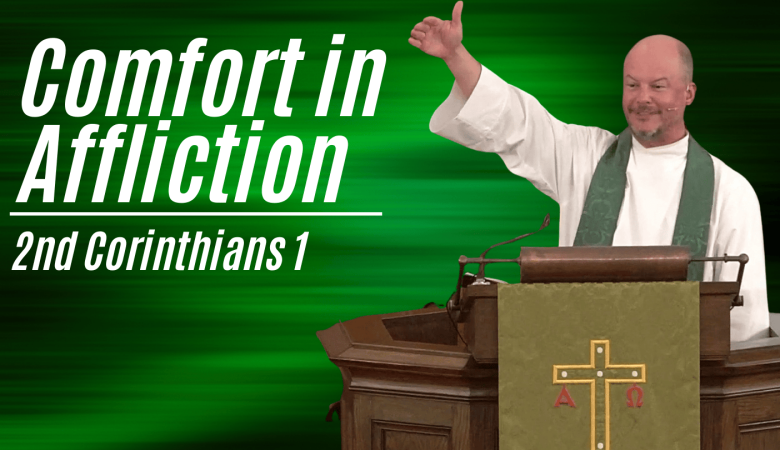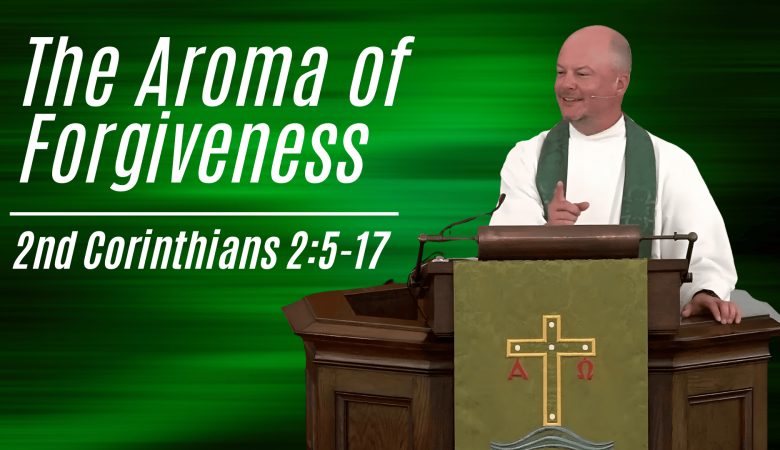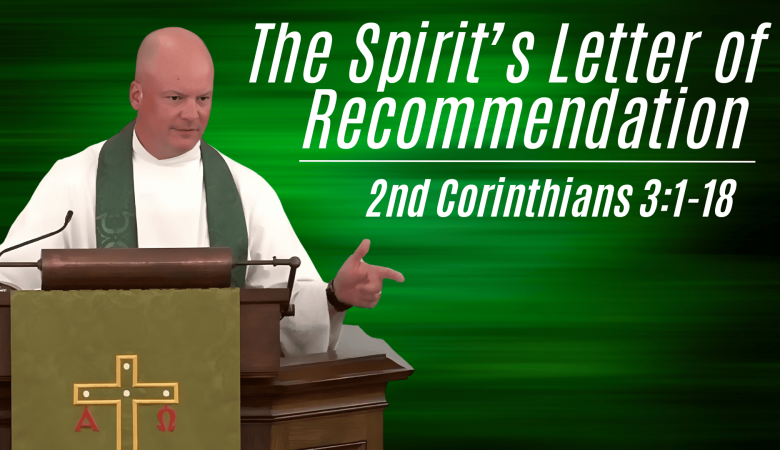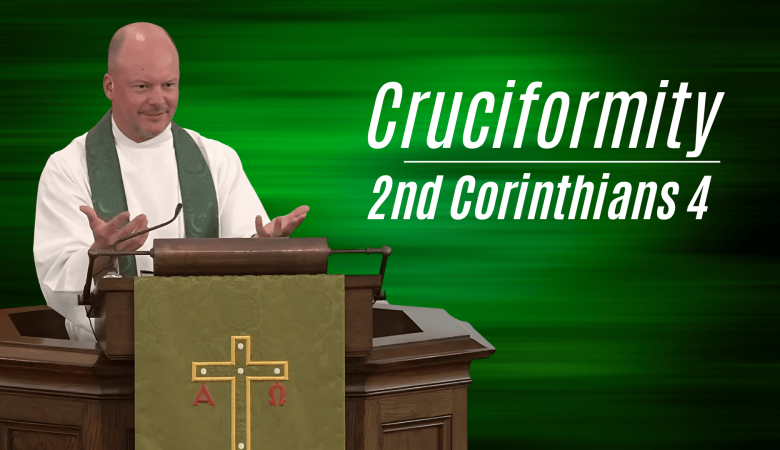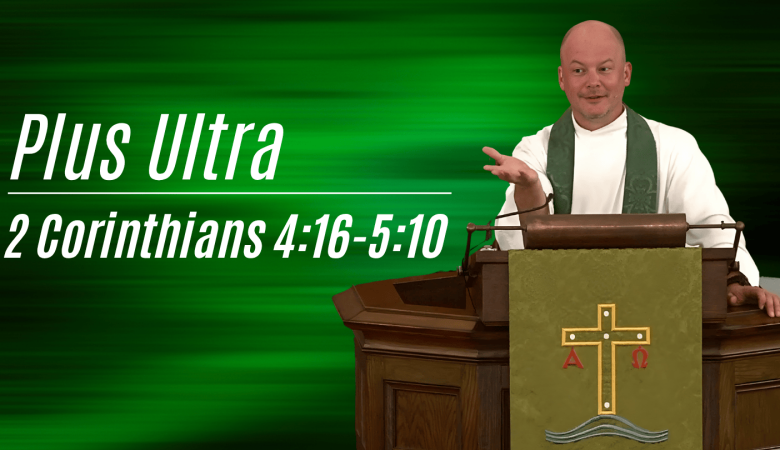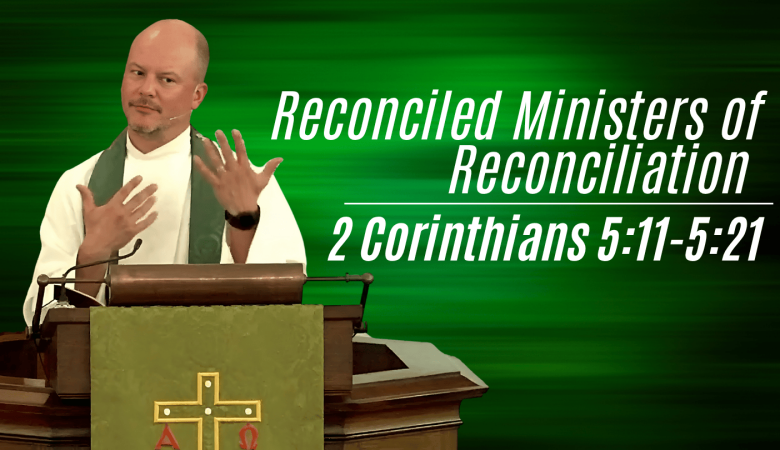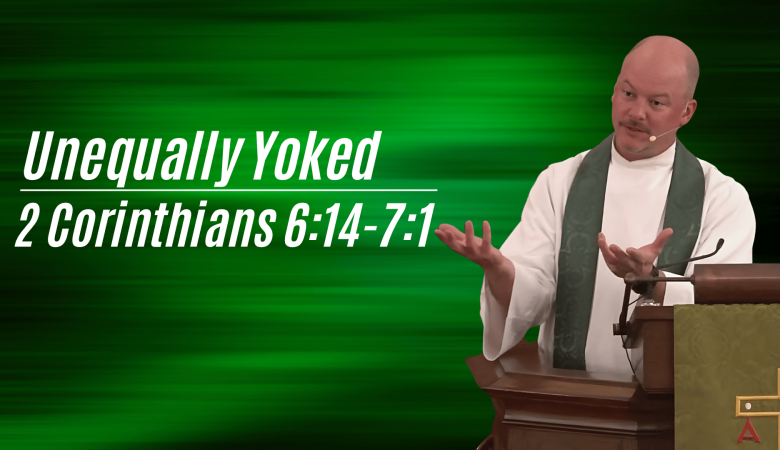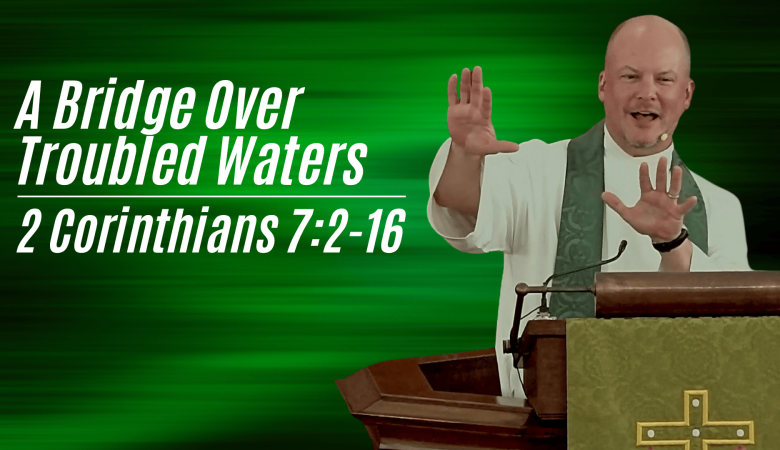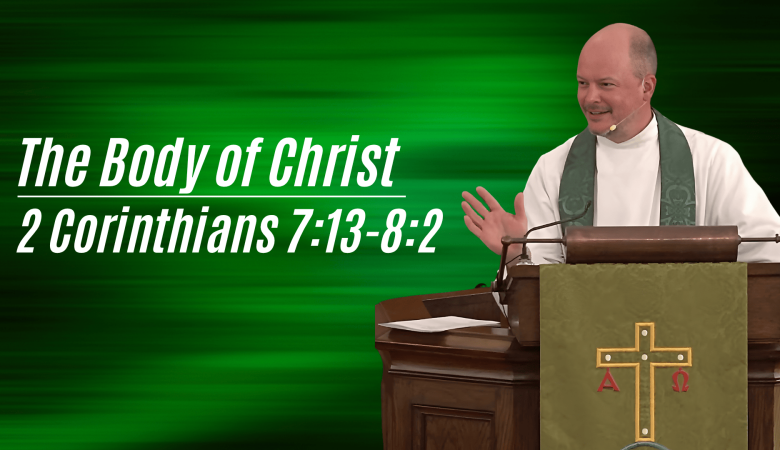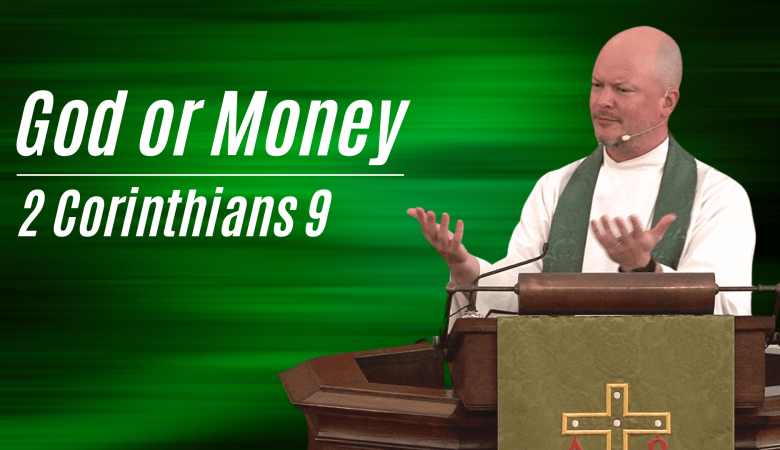Series: Power in Weakness
Ambassador for Christ
October 12, 2025 | Peter Rowan
Summary
"Mimicry is an act of love" - When Paul suffered for others, he was copying Jesus! This isn't just about following rules, it's about loving someone so much you want to BE like them. What does it look like to mirror Christ in your daily life?
Transcript
Lord, thank you. You say that out of the mouth of infants and babes, you have ordained praise. We're thankful this morning to get to hear your word from some of our younger members of our church. Thank you for the attentiveness they had in their practicing and the way that they helped that word to come alive to us a little more fully. Their lips now, Lord, would you do the same through me? Passage in second Corinthians. May the words of my mouth and the meditations of our hearts be pleasing in your sight, O Lord, our rock and our redeemer.
I think this is just cutting in and out, so hopefully you can bear with me. We're in Second Corinthians, chapter six. And in many ways this first section is. And actually it will continue to a little bit, but it will build off the idea of being an ambassador of Christ, God making his appeal through us. In fact, it's part of the great argument of 2 Corinthians that power is made perfect and weakness not just in Paul's life, but in the life of the church, that the life of the church is also called to be the way, the means through which God makes his appeal, the ambassador reality of the church.
But first, I want to draw your attention to Psalm 19. And I will say that this was largely because when I began working on this, we were going to be outside. We're not. But a little bit of that. I want to draw your attention to that. But first I want to mention that I was reading again. I have a little book. It's short. In fact, it's even shorter than what it looks like because there's a facsimile of the text in the second half of this book. But it's Planner o' Connor's prayer journal from when she was a student and at the University of Iowa's writing workshop. It's a lovely little prayer journal. I would commend it to you. She's very open and honest in such a lively and fresh way with the Lord. And in that journal, among other things, she writes, there is a whole world around me that I should be able to turn to your praise. The sensible world, the physical world, the world of the senses around her that she should be able to turn to the Lord's praise.
The Psalm 19 begins like this. I'm not going to read it all again for you. But it begins like this. The heavens declare the glory of God. The sky above proclaims his handiwork. Day to day pours out, each night to night reveals knowledge.
We were Going to be out in creation right now. And I will say it is no wonder that so many people say that they have had some of the most spiritual experiences being drawn near to God out in his world, out, that is, out in nature. I mean, I would guess I would you have had that experience. God came close to you, present in a really, like, a truly supernatural way, out in the wonder of his world. Maybe out hiking Hawk Rock or out on the. At down in the Cumberland Valley. And maybe you've been out at the shore and just the expanse of the ocean has spoken to you of the God. Maybe, yes. How small you all are. But also you've had this immense experience of I am valued. I am a real true part of the wonder that is this world. Had a sense that actually gave you breath, gave you your life.
Christian theology has long called this reality of the witness of creation, the ambassadorship of creation, general revelation, God's revelation. Revelation being the revealing that God truly and really reveals himself in nature. That that experience you had isn't something to toss aside. But God actually truly does speak in those real experiences out in the wilderness of his world, out among the rocks and trees and stars and seas, out along Fish Valley. Is this too distracting? The clicking? Should I just project? You do that? Yeah, I can pivot to. Let's do that. All right. Do I need to start over? Y' all following me? No. Okay, let me take this off.
Anyway. So this is a theme in Christian theology and throughout Scripture. The creation itself is proclaiming God. It's a revelation God. We could say that creation, in fact, is God's first ambassador. God spoke the world into being, and then the world speaks back. His praise, the reality of what he has done.
I love our church building. I really do. It's often that I might, you know, walk through this space with somebody who's maybe at Logos, and somebody comes in, they go, wow, this is, like, lovely. And we have lots of reasons to give thanks for this space. We do. Think of the rooms being used by Logos or our English classes. Think of actually the space directly below here right now where some of our children are learning the stories of our Lord and the liturgies of our faith, the habits of life following God and how. It really is this beautiful worship space with the stained glass windows there. It's a lovely space for them to gather together to worship the Lord. This is a gift.
And you actually may know this. I was reading this week some about the American chestnut. The American chestnut started to die off in 1904. There was a parasitic fungus that killed off the American chestnut. It took about 45 years, or 50ish years, they think early 50s, until they died off. But that fungus actually started to infect the American chestnut in 1904, which was the very year that this wood paneling and the pews that you're sitting in and this back here and that pulpit would have been cut down and cured and fashioned into this space. This is American chestnut that you're surrounded by right now. And how lovely it is. There are many gifts that this building has and the people that have gone before us have given it to us.
And while this is all gift, it is a gift in some ways a greater gift to be out in the wonder of the world singing the praises of the Lord, which we were intending to do this morning right down in at Schaefer retreat, because we are joining our voices in a very real way, surrounded by the chorus of the trees and the rocks and the creek there, the grass under our feet. What I'm saying is that creation itself bears witness to God. Creation is an ambassador for God.
Let me press into this a little bit more. I read an article in the British news publication the Times last week. It was about a book that is being. It was. Actually the English version of the book is being published this week. It's written by two Frenchmen. Its title is God the Science, the evidence. It sold 400,000 copies already in French, and its first printing in English is 110,000 copies. They insist that their book is not a religious book, but rather a scientific critique of the materialist explanation of the existence of the world. They say the theory that all reality, including our origins, thoughts and consciousness, can be explained solely by physical matter and physical process doesn't hold up to science, they're arguing.
So this article said their book explores key scientific theories such as the Big Bang, the theory of relativity, quantum mechanics, and the human genome. Each detail was checked with a group of leading scientists to ensure the argument could not be challenged on the basis of scientific accuracy. In fact, the preface for the book was written by the renowned physicist Robert Wilson, who who won the Nobel Prize for physics. But the whole thing is this creation itself is pointing to the idea of a creator of God himself. Speaks of God's ambassador for God. They say we are all believers. Believers in God believe with some evidence, and believers in materialism. They believe in plenty of things that are a little bit weird. That's what the author said. What they're saying is that science itself is commending the idea that creation is an ambassador. Creation declares the glory of God. It's a general witness to the grace of God.
So back to Flannery o'. Connor. After writing, there is a whole sensible world around me that I should be able to turn to your praise. She then adds, but I cannot do it. In some ways, she's a part of creation that actually isn't doing. She's part of the sensible creation that doesn't always do what she's intended to do, she says. Yet at some insipid moment when I may possibly be thinking of floor wax or pigeon eggs, the opening of a beautiful prayer may come up from my subconscious and lead me to write something exalted. She wrote that at 21, creation itself speaks to God.
But as much as the Bible speaks about this, and as much as our own experience actually does, this being out in the world, out in the beauty of the natural world, as much as science itself is actually increasingly pointing us to that, Christian theology has also said that the witness of God is not just in this general revelation, but more specifically in his special revelation of Scripture, that Scripture is an ambassador.
So maybe you caught this. Maybe especially if you were following along in Psalm 19. But Psalm 19 begins the first half with this general revelation. And then it turns and it says, the law of the Lord is perfect, perfect. And then it says, reviving the soul, that it's. It's actually the word of God as the ambassador of God sent out that revives our souls, that gives life to what was once dead. So turn to the special revelation of Scripture. And what we find in the special revelation of Scripture is actually part of. Part of how this chapter, chapter six begins.
So verse one and two of chapter six. And Second Corinthians says, working together with him, then isn't that wild? Working together with him, Working together with Christ. We appeal to you not to receive the grace of God in vain. For he says, in a favorable time, I've listened to you, and in the day of salvation, I've helped you. Now, that's quoting from the passage that Ruth read for us from Isaiah 49. 8. And if you. I hope you were able to listen as Ruth read that for us. Because then it goes on to talk about what the Lord has done. I mean, it's talking about the restoration of Israel, but it's actually hearkening back to the whole story of what God has done in his special revelation, revealing of the works of God in. In Scripture.
So the Lord says, the prisoner says, come out to those who are in darkness appear. See in Just those few verses. What we see throughout the text of God's special revelation in Scripture. What do we learn about early on with Adam and Eve, they're hiding. God says, where are you? It's as though it's there, right there in Isaiah 49, come out, come out. What do we find at the beginning of the book of Exodus but God calling out those who are in slavery, Prisoners, come out, appear, come to me. Think about even as they go along. I mean, if, if we could keep looking at. Isaiah 49 talks about how he provides for them. Well, what does he do when they're out in the wilderness? He feeds them. He gives manna from heaven, water and the rock, the pillar of fire and the cloud, all of that God bringing them. And he brings them to the promised land. God calls them out out of their fear of man, out of their own strength, out of their need and to himself. This is the great theme of Scripture. God calling us out and bringing us near to Himself, providing for for us.
I've met with many of you and I've had this kind of conversation. But I had one of these conversations this week with somebody in our church who said that part of coming to God was knowing that he couldn't deal with it. He was going to be in darkness, he was going to continue habits of sin and this other kind of life. He knew he couldn't do it, knew he couldn't do it. And he turns and finds the Lord and the hope of Christ and the special revelation of God in Scripture. So even this verse, even that little verse there from Isaiah 49 recalls for us the wonder of God's revelation of himself in the Scriptures. And what I'm saying is that creation itself is an ambassador for God. That's true. But the Scriptures themselves are a more definitive ambassador for God. Look at how I'm saving you. Look at how I'm bringing you to myself.
Here's the interesting thing is if we looked actually at the passage right before Isaiah 49, 8 earlier in that passage, what we would hear actually is a foretelling of the coming of Jesus. Because what we don't just have is God revealing himself in creation and in special revelation of Scripture. But what we ultimately have is that God reveals himself by the Lord Jesus himself, that we can say that the greatest ambassador for God is God, God coming among us.
So in verses 6 and 7 of Isaiah 49, it says, I'll make you as a light to the nations, that my salvation may reach to the end of the earth. Thus says the Lord The Redeemer of Israel and his Holy One to one deeply despised, abhorred by the nations, the servant of rulers. Kings shall see and arise princes, and they shall prostrate themselves because of the Lord who is faithful. The Holy One of Israel who has chosen you, speaks of the great servant king, God revealing himself as over all. And yet the great servant. What is that? But actually the Lord Jesus himself, God makes his appeal to us through Christ. Be reconciled to God. He who knew no sin became sin, that we might become the righteousness of God. The one who's over all becomes lowly, despised, rejected, scorned, spat upon, crown of thorns placed upon him that he might be the ambassador, bringing many sons to glory, calling them out from their sin. And in all this he remains faithful, full of the Spirit of God, full of grace and truth. Christ is the great ambassador. Creation is an ambassador. Scripture is. But Christ is the great sent one by God. God so loves the world that he gave his only Son that whoever believes in him would have eternal life.
Here's the interesting thing, though, and this is actually what a lot of this passage here in Second Corinthians is about. Creationism. The only ambassador. And scripture isn't. And actually Jesus isn't the only ambassador, even though he's the Pinnacle Ambassador. Verse 1. If you have your Bible open again, there's working together with him, then we appeal to you. Or verses three and four says we put no obstacle in anyone's way, so that no fault may be found with our ministry. But as servants of God, we commend ourselves in every way. And how can Paul say that? Seems. I don't know, does it sound boastful to say we can commend ourselves in every way? Well, he commends himself out of this place of being God's ambassador, the ambassador for Christ. And how can he say that, but that he is reflecting Christ in his ministry to them, specifically through his righteous endurance and suffering.
First, his suffering. What you see there, if we read it all through all those verses, is this long list of what happens to Paul and how he interacts with it. You know, starting in verse four in affliction, hardship, calamities, beatings, imprisonments, riots, labor, sleepless nights, hunger, impurity, knowledge, patience, kindness, all of that. What we find first is this list of afflictions, hardship and calamities. And Paul's saying that he has this general kind of suffering, that he has experienced these things outside of his control and outside of necessarily who he is. But he's done this for their sake. And Then he moves, actually. So that's the first little triplet there. The next one is actually sort of specific to Paul's suffering. Beatings, imprisonments, riots. That's not necessarily something you've experienced, but Paul's saying he's experienced it, and he's experienced it for their sake. As an ambassador of Christ, he's experienced this suffering. And then the third one, he says, labor, sleepless nights, hunger. In some ways he's saying, I voluntarily do this. These in some ways are voluntary things, things that he's given up for their sake to be an ambassador for Christ.
So part of my point, though here is that Paul is saying he is suffering, that the sake of Christ might go forth into the world as an ambassador. He is suffering, but he's not suffering generally, right? This isn't just the fact that he's suffering, but he's suffering righteously. So verses six through seven, it says this by purity, knowledge, patience, kindness, the Holy Spirit, genuine love by truthful speech and the power of God with the weapons of righteousness for the right hand and for the left. Which is to say that in his suffering he can still say that he lives in purity, in patience and kindness and genuine love and truthful speech. Which, if you put these together, in some ways, what you could say is that he's living the fruit of the Spirit and putting on the armor of God. He's grabbing these ideas that he speaks of elsewhere and says, this has actually been true of my ministry among you, of being an ambassador for God through Christ, even in his suffering. What he's saying is it's not general suffering, it's suffering lived in light of the reality of being led by the Holy Spirit, equipped by the power of God.
But this suffering, even this righteous suffering, is also marked by endurance. And so then you look at verses 8 through 10, and it seems as though we almost have these paradoxes at play here. Through honor and dishonor, through slander and praise, we're treated as imposters, and yet are true, as unknown, and yet well known, as dying. And behold, we live as punished, and yet not killed, as sorrowful, yet always rejoicing, as poor, yet making many rich, as having nothing and yet possessing everything. And what these paradoxes, it seems like what he's mostly putting before us are doing is they're putting forth this idea of endurance, of endurance. In honor and in dishonor, he's faithful, continuing slander and praise, he's treated as imposter. Yet he's true. He's continuing on for their sake, that they might know God. They might know the Lord Jesus. Suffering, righteous suffering through endurance.
I read this week that Christian history will convince you that the more faithful a Christian is, the more difficulties accumulate in his life and the more burdens he chooses to lay upon himself for Christ's sake. Find me anywhere in the Christian past a great man or a great woman who went to heaven in an easy way. We do not find this man or woman in the Bible. We do not find them in church history. This is not just the call generally, but this is the call specifically for Paul and specifically for the life of the church. Faithful, righteous suffering, endurance.
Paul is an ambassador for Christ. That's partly what I want you to hear this morning, because he is reflecting Christ. He's mirroring Jesus. Jesus comes as the great ambassador from God. Not just a general revelation of creation, not just this special revelation of the Scriptures, but the particular revelation of God incarnate among us. Here's God. What we find is his righteous suffering through endurance. Enduring suffering. He's righteously enduring suffering for our sake. And Paul comes as this ambassador for Christ. And he mimics this reality, mimics the reality of Jesus.
Now, children here, some of you are still with us. Ah, we actually have the older, older. Ish children here. So maybe some of your siblings are downstairs. My guess is that maybe some of the ones that are downstairs like to copy you. Not uncommon. Yeah, right. I get a little nod there. It's not uncommon in our house to hear things like so and so is just following me around, doing exactly what I'm doing. Mom, they are just saying the exact same words I just said. And I will acknowledge that's kind of annoying sometimes. Okay, that's kind of annoying. But. But as annoying as that is, actually, oftentimes that's a great act of love. Right? It's a great act of love. Mimicry is an act of love. Copycatting is saying, well, that's how I want to be. And that's what Paul is placing before them. I'm mimicking. I'm imitating the one whom I love for your sake. That's what Paul is doing. His story, you could say, is Christ's story. Because what does he desire but to be an ambassador, to be a reflection, to be a mirror. The Lord Jesus himself, his life is witness to Christ who righteously endured suffering for us, that we might be brought near to God. Paul's saying, this is my desire in my life for you.
But interestingly, so interestingly, this passage isn't just about you. Know, create, or this passage is not too much actually about creation itself being a revelation. But the passage isn't just about Scripture being a revelation or about Jesus being the full revelation, or even about Paul being the great revelation, the ambassador. But it's also actually about the church being an ambassador for Christ. It's about the Corinthians, but it's also about us.
So look with me down at verses 11 and 13. It's kind of interesting. This happens quite a bit when you look at different commentaries about the Scriptures. And different commentaries, they break down the passages differently. It seems like in Second Corinthians a lot. I look at one and he's like, well, the section is this verse to this verse. You look at another, it's this verse to this verse, and this. These few verses, they're kind of in one or the other. But this is what it reads, We've spoken freely to you, Corinthians. Our heart is wide open. You're not restricted by us, but you are restricted in your own affection. In return, I speak to you as children. Widen your hearts also. No doubt this is a statement about Paul's love for the church, but I would suggest to you that in this context, it's also not a statement about his love, but a call, call to them, a call to their own ambassadorship.
So if you look back at verse three, you'd read, we put no obstacle in anyone's way so that no fault may be found with our ministry. And that word there, the fault may be found. Actually, it's just fault. The may be found is filled in by the translators. But that word fault is often translated by ridicule or mockery, something that you look down on, you disdain. And so part of what Paul is doing, he's speaking to this reality. They might disdain Paul's ministry because it's been marked by these kinds of things, this kind of suffering, this kind of righteous suffering. And again, the temptation was to find that this kind of ministry that was full of affliction and beatings and sleepless nights and all the rest was not a ministry worth commending a life worth living. And Paul says, the answer to this is, widen your hearts. The object of your affection is too small.
Why that seems ridiculous is because the things of this world have grabbed onto your heart and you think that you can't give them up because that's where your heart is holding fast to. And he said, if. If that's the case, your heart needs to be enlarged, needs to be made bigger to understand that God has something on offer for you, much more than what this life here has on us. If you look at the life of Paul and you say, ah, I, I don't, I don't think there's much there. He says, then you're actually missing the whole good news of the gospel because it's a reflection of Jesus. But he's also saying, your loves are too small, your affections are too small, and there is something on offer for you that is much, much greater. Because if you die with Christ, you will also be raised with Christ. You need wider hearts.
Let me end by getting back to Flannery oconnors prayer journal. She offered, there's a lot of lovely prayers in that short journal. And again, I would commit it to you. But she offers a prayer in that actually, I mean, it's, it's in the midst of a longer prayer. But she offers this prayer that I hope is sort of the lifeblood of our church together, just the beating heart of who we are. And I think that's what Paul is doing in this church in Corinth. He's saying, this is what I desire for you to be for the DNA, the life of the church. She says this. Don't let me ever think, dear God, that I was anything but the instrument for your story. Do you hear her in that? She's saying, in all that I am, in all that I do, be an ambassador for who you are. Let me read it again. Don't let me ever think, dear God, that I was anything but the instrument for your story.
Let me pray that over us, Lord. Dear God, don't let Second City Church ever think, ever act or live like we are anything but the instrument for your story. In Jesus name we pray. Amen.
Series Information
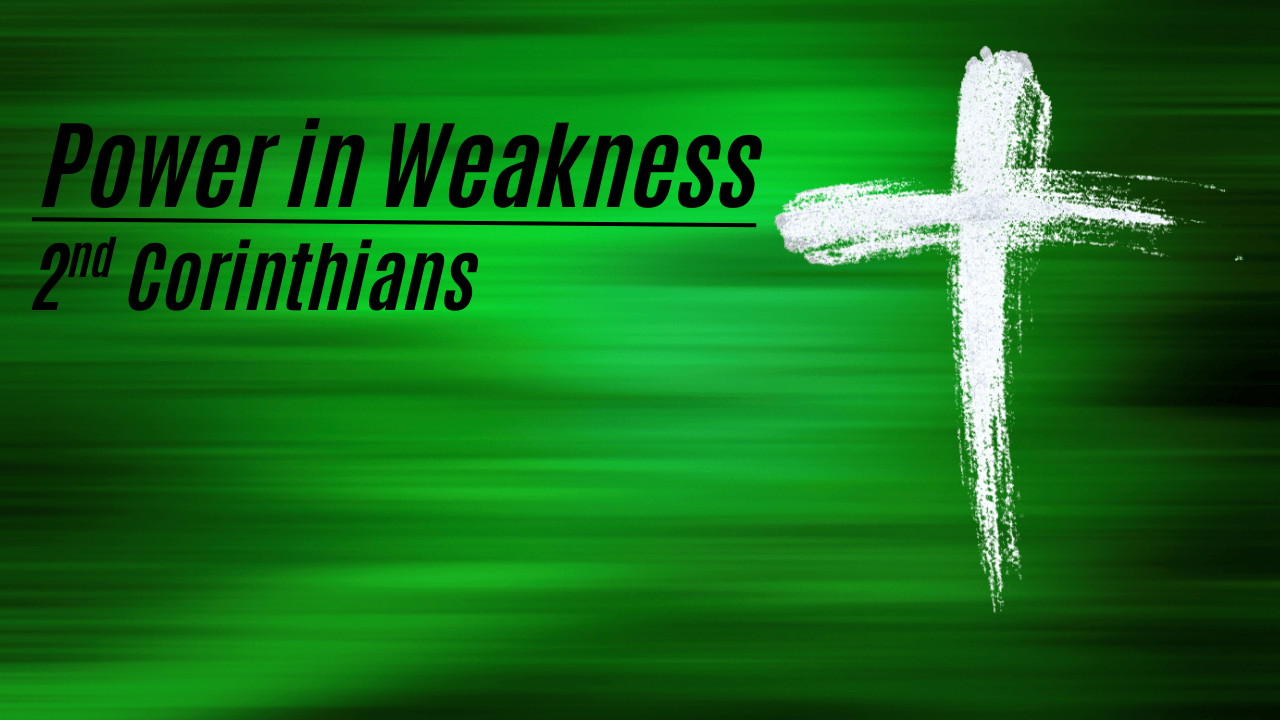
Second Corinthians is Paul’s defense of his love for and love toward the church in Corinth. Paul’s defends his apostolic ministry against critics who question his authority. He recounts profound suffering—beatings, imprisonment, near-death experiences—yet refuses to boast except in his weaknesses. Through personal vulnerability, Paul reveals Christ's power working most effectively in human frailty. He describes his mysterious "thorn in the flesh," where God's response becomes the letter's centerpiece: "My grace is sufficient for you, for my power is made perfect in weakness." Paul embraces this paradox, demonstrating that divine strength flows through broken vessels. His authenticity and struggles validate rather than undermine his ministry, proving that God's power shines brightest through human limitation and dependence.

